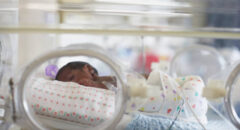 A new possible cause for preterm births has been unearthed – calcium buildup.
A new possible cause for preterm births has been unearthed – calcium buildup.
Researchers based in Ohio found that abnormal calcium buildup in the womb triggers premature water breaks in expecting mothers. According to the study, published in Science Translational Medicine, the calcium buildup is what can cause the rupturing of the amniotic sac.
Getting proper calcium is important during pregnancy, of course. Calcium helps developing babies build strong bones and hearts, and also helps mothers reduce their risk of hypertension and preeclampsia. However, it may be important for moms to know that the body can only absorb 500 mg of calcium at a time, according to BabyCenter.com.
It’s been known that some health conditions or infections can lead to a baby being born before the healthy 37 weeks mark. But, typically, physicians have been unsure about what causes premature births.
During the study, researchers found larger amounts of calcium buildup in the amniotic sac after the water broke too early than in the sacs of full-term births.
The calcium-containing particles are produced by amniotic fluid, according to the research. However, the fluid also contains a protein that works to keep the particles from landing in the amniotic sac. The fetus to protect itself, according to Dr. Irina Buhimschi of Nationwide Children’s Hospital, produces this protein.
More than 200,000 women experience preterm births every year, according to Mayo Clinic. A normal pregnancy usually lasts for between 37 and 40 weeks.
Premature babies can live healthy lives. But many come out of the womb with a variety of health complications. Physicians usually keep premature babies in intensive care for weeks to make sure that organ and overall growth happens properly and without further complication.
The calcium buildup found in the amniotic sac is similar to that leading to arthritis or kidney stones.
More than 100 expecting mothers were analyzed during the course of the study. Experts believe the study’s findings can lead to more research and education when it comes to premature births.
“To have a new potential mechanism for one significant form of preterm birth is quite exciting,” Dr. Edward McCabe, chief medical officer of the March of Dimes, told CBS News.
Women ages 19 to 50 should aim for a calcium intake of 1,000 milligrams (mg) a day before, during, and after pregnancy. Women 18 and younger should aim for 1,300 mg a day before, during, and after pregnancy. Consult with your doctor to determine if changes in your diet are necessary.









